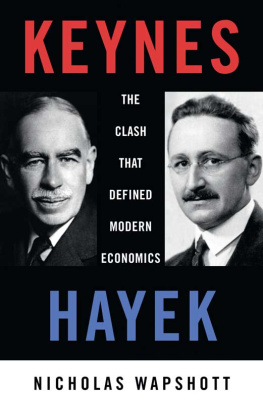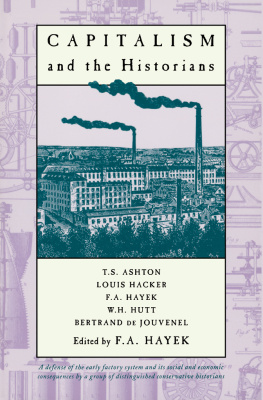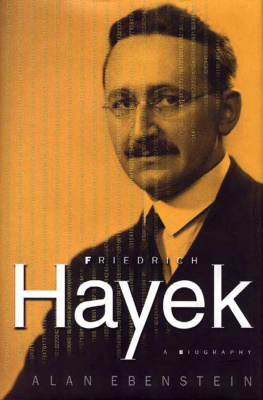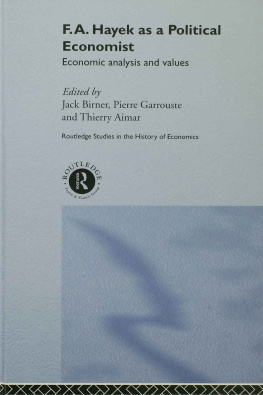Burczak - Socialism after Hayek
Here you can read online Burczak - Socialism after Hayek full text of the book (entire story) in english for free. Download pdf and epub, get meaning, cover and reviews about this ebook. year: 2006, publisher: The University of Michigan Press, genre: Politics. Description of the work, (preface) as well as reviews are available. Best literature library LitArk.com created for fans of good reading and offers a wide selection of genres:
Romance novel
Science fiction
Adventure
Detective
Science
History
Home and family
Prose
Art
Politics
Computer
Non-fiction
Religion
Business
Children
Humor
Choose a favorite category and find really read worthwhile books. Enjoy immersion in the world of imagination, feel the emotions of the characters or learn something new for yourself, make an fascinating discovery.

- Book:Socialism after Hayek
- Author:
- Publisher:The University of Michigan Press
- Genre:
- Year:2006
- Rating:4 / 5
- Favourites:Add to favourites
- Your mark:
- 80
- 1
- 2
- 3
- 4
- 5
Socialism after Hayek: summary, description and annotation
We offer to read an annotation, description, summary or preface (depends on what the author of the book "Socialism after Hayek" wrote himself). If you haven't found the necessary information about the book — write in the comments, we will try to find it.
Socialism after Hayek — read online for free the complete book (whole text) full work
Below is the text of the book, divided by pages. System saving the place of the last page read, allows you to conveniently read the book "Socialism after Hayek" online for free, without having to search again every time where you left off. Put a bookmark, and you can go to the page where you finished reading at any time.
Font size:
Interval:
Bookmark:

SOCIALISM AFTER HAYEK
ADVANCES IN HETERODOX ECONOMICS
Fred S. Lee, University of MissouriKanas City, Serious Editor
Rob Garnett, Texas Christian University, Associate Editor
Over the past decade, economists seeking alternatives to mainstream economic thinkingheterodox economistshave undertaken novel, integrative reformulations of their own theoretical traditions, including Austrian, Feminist, Institutional-Evolutionary, Marxian, Post Keynesian, Radical, Social, and Srafflan economics. Despite long-standing rivalries among these heterodox paradigms, a new wave of pluralism since the early 1990s has given rise to new conversations within and among them, fueled by a shared desire to overcome the limitations and hegemony of mainstream economics. To encourage this new generation of economic research, Advances in Heterodox Economics aims to publish books that promote fresh lines of heterodox work in economic theory, policy, philosophy, intellectual history, institutional history, and pedagogy.
Economics in Real Time: A Theoretical Reconstruction
John McDermott
Socialism after Hayek
Theodore A. Burczak

Theodore A. Burczak
T HE U NIVERSITY OF M ICHIGAN P RESS
Ann Arbor
Copyright by the University of Michigan 2006
All rights reserved
Published in the United States of America by
The University of Michigan Press
Manufactured in the United States of America Printed on acid-free paper
Printed on acid-free paper
2009 2008 2007 2006 4 3 2 1
No part of this publication may be reproduced,
stored in a retrieval system, or transmitted in any form
or by any means, electronic, mechanical, or otherwise,
without the written permission of the publisher.
A CIP catalog record for this book is available from the British Library.
Library of Congress Cataloging-in-Publication Data
Burczak, Theodore A., 1964
Socialism after Hayek / Theodore A. Burczak.
p. cm. (Advances in heterodox economics)
Includes bibliographical references and index.
ISBN-13: 978-0-472-09951-1 (cloth : alk. paper)
ISBN-10: 0-472-09951-5 (cloth : alk. paper)
ISBN-13: 978-0-472-06951-4 (pbk. : alk. paper)
ISBN-10: 0-472-06951-9 (pbk. : alk. paper)
1. Socialism and society. 2. Hayek, Friedrich A. von (Friedrich August), 1899 I. Title. II. Series.
HX542.B79 2006
335dc22
2006008019
ISBN-13: 978-0-472-02430-8 (electronic)
Stephen Cullenberg
Two dates, seventy-four years apart, serve as bookends to the twentieth centurys many experiments with socialism. On November 8, 1917, Vladimir Lenin announced the formation of a new communist government in what was to become the Soviet Union, a government that ruled in one form or another until Christmas Day 1991, when Mikhail Gorbachev resigned and handed over power to Boris Yeltsin.
For many, the collapse of the Soviet Union represented the triumph of liberal capitalism and the end of a century-long debate over socialism and communism. Whether one was concerned about the viability of actually existing socialist countries, such as Yugoslavia, China, or Cuba, or the theoretical possibility of new forms of socialism in capitalist countries, such as Japan, France, or even the United States, suddenly the very idea and project of socialism seemed pass. The triumph of capitalism was widely proclaimed. The End of History was nigh, not as the inspired liberation of universal freedom of working people everywhere, as Marx and Engels had predicted in the Communist Manifesto, but, rather, as the coldly efficient ascendance of global neoliberalism.
Many reasons have been offered for the collapse of socialism, ranging from the inefficiency of planning in a large economy, to the lack of material incentives and rewards for innovation, to the overly statist and undemocratic nature of socialist politics, to the outside aggression and imperialist advances of capitalist countries. An alternative explanation, which I favor, focuses not so much on the failure of socialist economies along one or another dimension but, rather, on a failure of the socialist imaginary.
Socialism has long been identified not only with an end to economic exploitation, exclusion, and alienation but also with the end of business cycles, the eradication of poverty, ecological sustainability, and the abolishment of racial, gender, and sexual oppression. This socialist imaginary has placed impossibly heavy burdens on socialist projects everywhere. Socialisms burden has been that not too little but too much has been asked of it. No economic system can guarantee such a myriad of beneficial outcomes. Socialism can and should instead be defined thinly, not as a modernist utopia, but as a project that seeks to end economic exploitation and exclusion through the transformation of class relations in production. Various types of socialism can and have coexisted with both democratic and non-democratic political institutions, with environmental degradation and ecological sustainability, and with poverty and egalitarian distributions of income. What makes the socialist project different from others is that within it those who participate in the production of surplus are not excluded from the decisions about how it is to be used and distributed, regardless of the difficulty of the decisions and trade-offs that the disposition of the surplus requires.
The deconstruction of socialisms burden in many ways takes its theoretical cue from what is now known as postmodern Marxism. In contrast to more traditional forms of Marxism, postmodern Marxism casts a skeptical eye on intellectual or political projects that seek to find an overarching logic to history or to provide a rational foundation for individual or class behavior. Postmodern Marxism looks for moments of dialectical surprise in history, moments of contingency and uncertainty that cannot be predicted or contained. It is in this sense that postmodern Marxism shares an affinity with the work of Friedrich Hayek, a profound critic of classical socialism and a doyen of the conservative Right today.
The dialectical surprise in this book is how Burczak uncovers and then recovers what he calls Hayeks applied epistemological postmodernism, and then shows how it can be used to rethink the socialist project in a new and unique way. Hayek was deeply critical of what he thought was the hubris and certitude of the classical socialist model. He felt that economic action (including the actions of government officials and professional economists) was characterized by uncertainty, error, and subjective perceptionwhat he called knowledge problems. These knowledge problems gave rise to other fundamental concerns for a socialist economy that many critics of socialism have pointed out: problems of incentives, information dissemination, and coordination.
Rather than dooming the idea of socialism, Burczak transforms Hayeks critique into a profound new way to think about socialism. By linking the Marxian focus on various forms in which surplus labor is performed, appropriated, and distributed to the Aristotelian capability theory developed by Amartya Sen and Martha Nussbaum, Burczak weaves a tapestry of a new model of socialism that is rich in its understanding of complex economies (and thoroughly informed by Hayek and the Austrian tradition of economics) while making visible many of the ethical concerns that have animated socialists for over one hundred years. This is heterodox economics at its best.
Font size:
Interval:
Bookmark:
Similar books «Socialism after Hayek»
Look at similar books to Socialism after Hayek. We have selected literature similar in name and meaning in the hope of providing readers with more options to find new, interesting, not yet read works.
Discussion, reviews of the book Socialism after Hayek and just readers' own opinions. Leave your comments, write what you think about the work, its meaning or the main characters. Specify what exactly you liked and what you didn't like, and why you think so.










